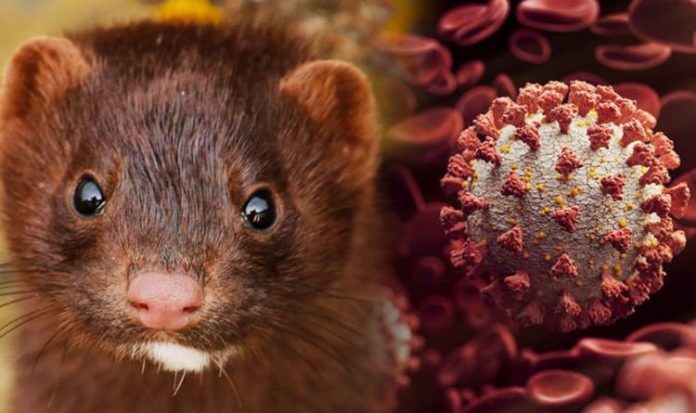Mink-related coronavirus has now been confirmed in more than 200 people in Denmark. The infection has triggered culls of all 17 million farmed mink in Denmark. The UK has now imposed an immediate ban on all visitors from Denmark amid concerns about the new strain. But what exactly is mink-related coronavirus and why is it dangerous to humans?
What is mink-related coronavirus?
A mink-related coronavirus strain has been identified in Denmark.
Minks were infected following exposure from infected humans according to the World Health Organization (WHO).
Minks can act as a reservoir of COVID-19, passing the virus between them, and pose a risk for virus spill-over from mink to humans.
People infected with this mutated virus can then transmit the virus to other humans and additionally spillback to the mink population can occur.
READ MORE: Mink virus: UK hospitals put on alert as dangerous mutation found
Denmark has now found mink-related versions of coronavirus in 214 humans since June according to a report from November 5.
The report, published on the State Serum Institute’s website, showed the most worrying strain had only been found in 12 people on five mink farms.
On Wednesday, in response to the new data, Denmark announced plans to cull some 17 million mink in the country’s 1,139 mink farms, in a bid to slow the spread of the mutated coronavirus.
Denmark has discovered several strains in around 207 farms, with the infection spreading across the western peninsula of Jutland.
So far six countries to date have reported coronavirus cases in farmed minks.
These countries include Denmark, the Netherlands, Spain, Sweden, Italy and the United States.
DON’T MISS
Denmark quarantine decision sparks Twitter outrage towards Shapps [INSIGHT]
Coronavirus fears: Fur farms could pose next pandemic threat [EXPLAINER]
Coronavirus horror: US on alert as animals infected by deadly virus [VIDEO]
However, mutations could be less effectively tackled by future vaccines according to experts.
Health experts have been concerned about mutations being less sensitive to antibodies.
Last week Danish Prime Minister Mette Frederiksen said the situation is “very, very serious” and could jeopardise attempts to develop a vaccine.
She said: “We have a great responsibility towards our own population, but with the mutation that has now been found, we have an even greater responsibility for the rest of the world as well.”
The WHO website reads: “It remains a concern when any animal virus spills into the human population, or when an animal population could contribute to amplifying and spreading a virus affecting humans.
“As viruses move between human and animal populations, genetic modifications in the virus can occur.
“These changes can be identified through whole-genome sequencing, and when found, experiments can study the possible implications of these changes on the disease in humans.”
WHO chief scientist Soumya Swaminathan said: “We need to wait and see what the implications are but I don’t think we should come to any conclusions about whether this particular mutation is going to impact vaccine efficacy.”







